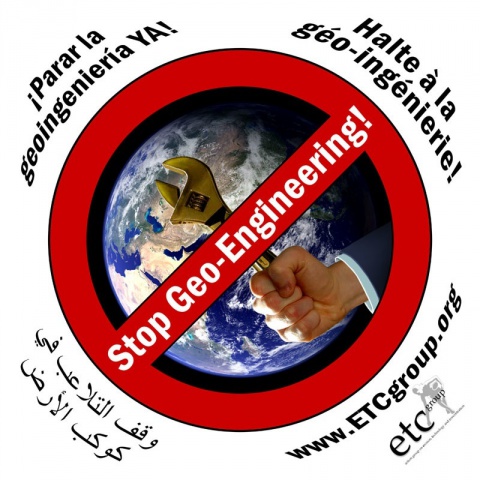Submitted by Joëlle Deschambault on

ETC Group News Release
16 April 2014
Last week’s negotiating session resulted in the UN’s climate expert body giving a reluctant nod of support to a controversial – and largely theoretical – geoengineering technique known as BECCS (Bioenergy with Carbon Capture and Storage). Geoengineering refers to extreme technological fixes that aim to alter the climate on a large scale. In its report approved Saturday April 12, Working Group III (WGIII) of the Intergovernmental Panel on Climate Change (IPCC) largely – and wisely – bypassed geoengineering, but did suggest that BECCS is a bitter pill that a warming world could find itself having to swallow. BECCS and other Carbon Dioxide Removal (CDR) technologies will be especially needed, according to the IPCC, in “overshoot” scenarios, where mitigation of greenhouse gas emissions is delayed or inadequate, necessitating faster, deeper emissions cuts in the long run to limit temperature rise. The IPCC notes that “overshoot,” in general, makes it less likely that any given temperature goal will be met.
In response, civil society groups warned that the bitterness of the BECCS pill derives from its toxicity:
“Relying on the promise of BECCS to allow an overshoot of emissions is not just a bitter pill; it’s a placebo that may be a poison pill,” said ETC’s Jim Thomas, who was in Berlin for the negotiations. “We don’t know if BECCS will ever be able to successfully suck carbon out of the atmosphere, but we do know that bioenergy sucks land out from under farmers, sucks trees out of forests, and it will suck momentum from efforts to curb carbon emissions. The prominence of BECCS in the IPCC’s latest report was a mistake.”
All components of BECCS (i.e., bioenergy, carbon capture, storage) are dangerous, uncertain and risky:
· Any deployment of BECCS that would have appreciable effects on the climate would require significant land use changes to convert land for growing biomass. The IPCC’s WGIII Summary for Policy Makers (SPM) itself noted, “barriers to large scale deployment of bioenergy include risks and concerns about greenhouse gas emission emissions from land, food security, biodiversity conservation and livelihoods.”
· There is currently no cost effective and secure way to store carbon dioxide (CO2) underground. At present, captured CO2 is sold to oil companies to increase recovery of oil, thereby increasing the amount of fossil fuels available to be burnt. Unsurprisingly, the fossil fuel industry is invested in developing carbon capture as a way of reassuring its investors that trillions of dollars of assets won’t lose value. In its report, the IPCC noted, “the availability of CCS would reduce the adverse effect of mitigation on the value of fossil fuel assets.”
WGIII acknowledged that, with regard to BECCS and CDR techniques, “The availability and scale of these…technologies and methods are uncertain and…are, to varying degrees, associated with challenges and risks.” Further, the Plurinational State of Bolivia issued the following reservation to their acceptance of the final IPCC text: “Technologies proposed by the IPCC to promote mitigation actions are primarily framed through the use of geoengineering based on Carbon Dioxide Removal (CDR) technologies, particularly with the use of bio-energy (BE) and carbon capture storage (CCS) and their combination as BECCS, and also technologies of Solar Radiation Management (SRM) are highlighted. These technologies violate the rights of Mother Earth, and particularly its right of adapting naturally to the climate change, and have an important impact on the livelihoods and in the fundamental rights of local and indigenous peoples.”
Advocates of geoengineering are likely disappointed by the report approved in Berlin last Saturday. Despite a two-year effort to get IPCC support for geoengineering and a special geoengineering working group for them to work through, the inclusion of BECCS, with only a qualified endorsement in WGIII’s contribution to the IPCC’s Fifth Assessment Report (AR5), was no victory. Last year, the UK Guardian revealed that Russia had successfully lobbied the IPCC’s WGI to mention solar radiation management (SRM), geoengineering proposals that attempt to block or reflect sunlight (1). According to the Associated Press, Russia applied similar pressure in WGIII (2), to no avail.
Though Saturday’s report was the last to come from the IPCC’s three Working Groups, the fight over geoengineering at the IPCC is not over. The IPCC has been drafting a synthesis document (SYR) from the reports of all three Working Groups, which governments and experts will begin reviewing within the next week. The aim is to have it approved and an advance copy distributed by the end of October 2014. The SYR will be the primary resource for UNFCCC negotiators when they meet 1-14 December for COP20 in Lima, Peru. The SYR is being drafted now and, despite the lack of enthusiasm for geoengineering in the three Working Groups, it occupies a slot in the SYR’s outline: “Geo-engineering – possible role, options, risks and status.” However, as ETC’s Jim Thomas notes, “Geoengineering’s poor showing in Working Groups Two and Three is a hopeful sign that its ‘placebo effect’ is wearing off.”
Endnotes:
(1) Martin Lukacs, Suzanne Goldenberg and Adam Vaughan, “Russia Urges UN Climate Report to Include Geoengineering,” The Guardian, 19 September 2013.
(2) Karl Ritter, “Climate change Plan B stirs controversy, doubt” Associated Press, 11 April 2014.
Notes to editors:
WGIII’s Summary for Policy Makers is available here:
http://mitigation2014.org/report/summary-for-policy-makers.
ETC Group has produced a short background briefing about the IPCC and geoengineering, available here: http://www.etcgroup.org/content/ipcc-ar5-geoengineering-march2014.
For more information:
Neth Daño (Philippines) – Neth@etcgroup.org +63 9175329369
Jim Thomas (Canada) – jim@etcgroup.org +1 514 2739994
Silvia Ribeiro (Mexico) – silvia@etcgroup.org +52 55 55632664
| Attachment | Size |
|---|---|
| 195.93 KB |
